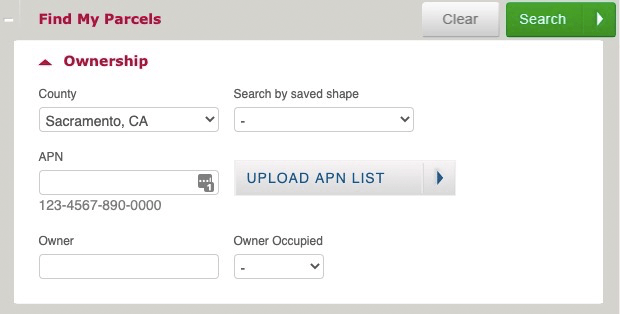California’s land ownership records are public and primarily managed at the county level, as there is no centralized statewide database for private property deeds or titles. These records include deeds, mortgages, liens, and property transfers, often maintained by the County Recorder’s Office (also called Register of Deeds in some areas) or the County Assessor’s Office for tax-related info like ownership verification and parcel maps. Federal lands (e.g., historical patents) are handled by national agencies, while state-owned properties fall under the California State Lands Commission.
California Property Ownership Search
Property Records
Online access varies by county: Larger ones like Los Angeles or San Diego offer robust free portals with searchable databases, while smaller rural counties may have limited digital records, requiring in-person visits or mail requests. Most searches are free for basic viewing, but certified copies can cost $1–$10 per page. Always verify with official county sites, as third-party aggregators may charge fees and lag in updates.
Step-by-Step Process to Check Records Online
- Identify the Property’s County: Use the address to determine the county. Tools like Google Maps or the USPS ZIP Code Lookup can help. California has 58 counties, so accuracy is key.
- Locate the County’s Official Portal: Search for “[County Name] County Recorder” or “[County Name] Assessor-Recorder” on Google or visit the county’s main website (e.g., [countyname].gov). A comprehensive directory is available at NETR Online’s California page , which links directly to each county’s recorder, assessor, and tax collector sites.
- Gather Property Details: You’ll need the address, owner’s name, parcel number (APN – Assessor’s Parcel Number), or legal description (from a deed or tax bill). If unknown, start with the assessor’s site for a parcel search to find the APN.
- Search the Database:
- Recorder’s Office: For deeds and historical transfers. Search by name, document number, or date. View scanned images online in many counties.
- Assessor’s Office: For current ownership, assessed value, and maps. Often includes GIS tools for visual parcel searches.
- Register or log in if required (free in most cases).
- Download or Request Documents: Free previews are common; pay for certified copies via credit card or mail. If not online, email or call the office for assistance.
- Verify and Cross-Check: Records may not reflect very recent changes (e.g., within 1–4 weeks). For legal purposes (e.g., buying property), hire a title company for a full title search to ensure clear ownership.
Examples for Major California Counties
Here’s how to access records in some of the most populous counties. For others, use the NETR directory or search “[County Name] land records online.”
- Los Angeles County (Population: ~10M; High online access):
- Recorder: Visit lavote.gov/home/recorder/real-estate-records/general-info for deeds since 1850. Search by name, address, or APN; free viewing, $2/page for downloads.
- Assessor: assessor.lacounty.gov/homeowners/property-search for current owner, value, and maps. Free; detailed tax portal integrated.
- San Diego County (Population: ~3.3M):
- Assessor/Recorder: sdarcc.gov/content/arcc/home/divisions/assessor/property-records.html for ownership, maps, and records. Free online searches; visit offices for older docs.
- Riverside County (Population: ~2.4M):
- Recorder: rivcoacr.org/PropertyInfo for deeds and searches. Free portal; strong integration with clerk services.
- Orange County (Population: ~3.1M):
- Recorder: Search via ocrecorder.com for deeds and documents. Free basic access; fees for copies.
- San Francisco County (Population: ~808K):
- Assessor-Recorder: sfassessor.org/property-information for ownership and assessments. Free searches; GIS maps available.
For smaller counties like Alpine or Mono, digital access may be limited—call the recorder’s office directly (find contacts via NETR).
Special Cases: Federal and State Lands
- Federal Properties: Use the Bureau of Land Management’s GLO Records for historical patents in California (e.g., from Gold Rush era). Search by name or location; free digitized docs.
- State-Owned Lands: California State Lands Commission handles public tidelands and state parcels. Use their Land Management Division for searches; contact for specific queries.
Third-Party Tools for Convenience
- PropertyChecker: Free basic searches by address ; includes deeds and permits. Good for quick overviews, but verify officially.
- ParcelQuest: Subscription-based for detailed data ; up-to-the-minute for all counties.
- Property Records of California: Aggregates info ; useful for sales history.
Tips, Limitations, and Best Practices
- Accuracy: Online records may not be real-time; lag 1–30 days. For disputes, get certified copies.
- Privacy: Owner names and deeds are public, but personal details like SSNs are redacted.
- Fees: Free for viewing; copies via mail or online (e.g., $1/page in LA County).
- Challenges: Pre-1980 records often aren’t digitized; request via phone/email. Rural counties may require visits.
- Legal Use: For buying/selling, hire a title insurer for abstracts. Genealogy? Pair with Ancestry.com for historical ties.
- Alternatives if Offline: Visit the recorder’s office (bring ID); or mail requests with fees.
This guide empowers you to trace California property histories efficiently. If you have a specific county or address, I can refine the steps further. Always consult professionals for binding advice.
